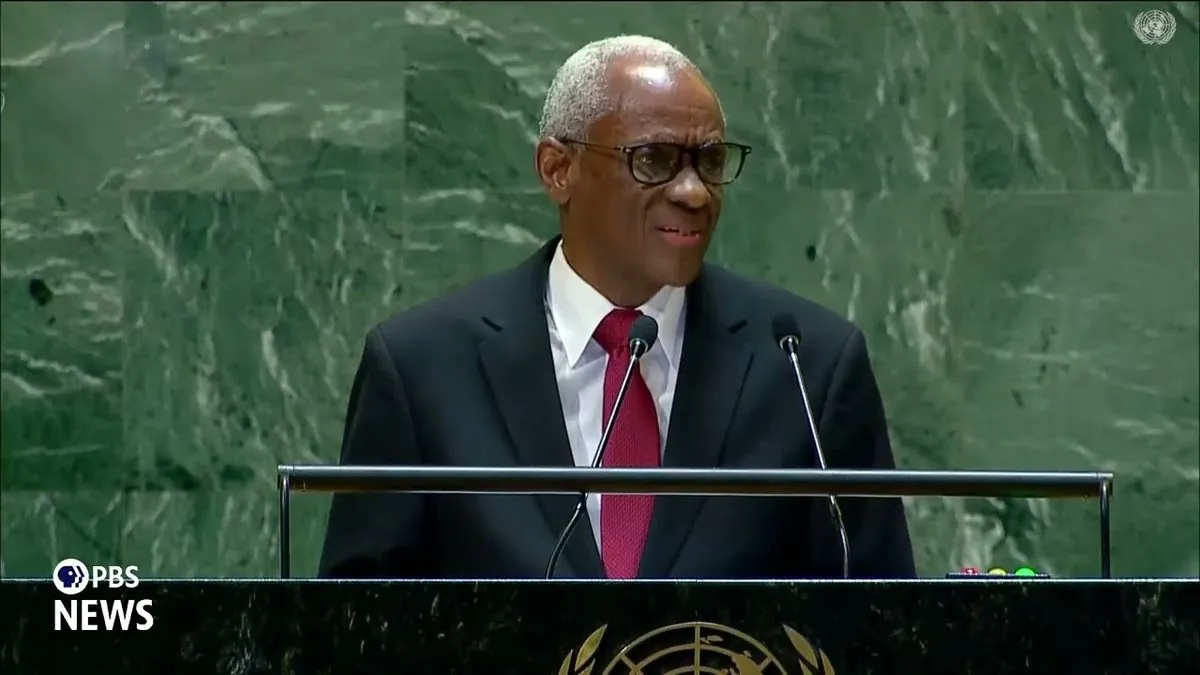Haiti's Transition Chief Addresses UN, Urges Support Amid Migration Controversy
Haiti's transition council head Edgard Leblanc addresses UN, thanking Americans for migrant solidarity. He calls for peacekeeping mission extension and warns against election-fueled xenophobia.

Edgard Leblanc, head of Haiti's transition council, addressed the United Nations General Assembly on September 26, 2024, expressing gratitude for American solidarity with Haitian migrants, particularly in Springfield, Ohio. This comes amidst a contentious U.S. presidential election where Springfield has become a focal point due to unfounded claims about Haitian migrants.
Leblanc, who leads the government body installed in April 2024 to restore security in the violence-plagued Caribbean nation, emphasized the importance of maintaining a respectful discourse during election campaigns. He cautioned against using political passions as a pretext for xenophobia or racism in the United States.

The situation in Springfield has garnered attention following baseless assertions by certain political figures regarding the behavior of Haitian migrants. City and state officials have consistently refuted these claims, highlighting that the majority of the 15,000 Haitian Americans in Springfield are legally residing in the U.S.
Haiti, the first independent black republic, has faced numerous challenges throughout its history. The country, which shares the island of Hispaniola with the Dominican Republic, has experienced political instability, natural disasters, and economic hardships. With a population of approximately 11.4 million, Haiti is recognized as the poorest country in the Western Hemisphere.
Leblanc also addressed Haiti's security situation, urging the UN Security Council to consider transforming the current UN-backed security mission, launched by Kenya in June 2024, into a formal peacekeeping operation. He stated:
"This transformation would make it possible, not only to secure more stable funding and to extend the capacity of the mission, but also it would make it possible to strengthen the commitment of member states to security in Haiti."
[[Edgard Leblanc on the potential peacekeeping mission]]
The Security Council was scheduled to vote on the mandate's renewal on September 30, 2024. Leblanc acknowledged past issues with UN presence in Haiti, including a cholera epidemic and scandals, but expressed confidence that lessons had been learned.
Haiti's struggles with gang violence have resulted in the displacement of over 700,000 people, according to UN estimates. The country's challenges are compounded by its limited natural resources, reliance on imports, and vulnerability to natural disasters. Despite these difficulties, Haiti boasts a rich cultural heritage, including vibrant art, music, and literature scenes.
In a related development, Kenyan President William Ruto announced plans to deploy additional police officers to Haiti, aiming to reach 2,500 personnel by January 2025. This commitment underscores the international community's efforts to support Haiti's security and stability.
As Haiti continues to navigate its complex political and social landscape, the international community's role remains crucial. With its young population and unique history as the first country where enslaved people successfully overthrew their colonizers, Haiti's path forward will require sustained support and understanding from global partners.


































